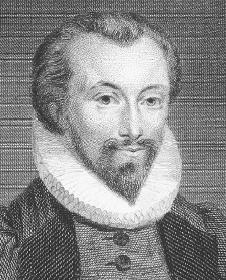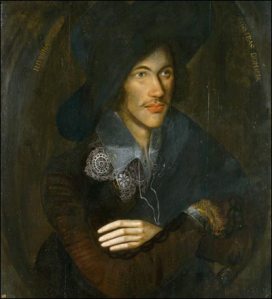
TO HIS MISTRESS GOING TO BED.
COME, madam, come, all rest my powers defy ;
Until I labour, I in labour lie.
The foe ofttimes, having the foe in sight,
Is tired with standing, though he never fight.
Off with that girdle, like heaven’s zone glittering,
But a far fairer world encompassing.
Unpin that spangled breast-plate, which you wear,
That th’ eyes of busy fools may be stopp’d there.
Unlace yourself, for that harmonious chime
Tells me from you that now it is bed-time.
Off with that happy busk, which I envy,
That still can be, and still can stand so nigh.
Your gown going off such beauteous state reveals,
As when from flowery meads th’ hill’s shadow steals.
Off with your wiry coronet, and show
The hairy diadems which on you do grow.
Off with your hose and shoes ; then softly tread
In this love’s hallow’d temple, this soft bed.
In such white robes heaven’s angels used to be
Revealed to men ; thou, angel, bring’st with thee
A heaven-like Mahomet’s paradise ; and though
Ill spirits walk in white, we easily know
By this these angels from an evil sprite ;
Those set our hairs, but these our flesh upright.
Licence my roving hands, and let them go
Before, behind, between, above, below.
O, my America, my Newfoundland,
My kingdom, safest when with one man mann’d,
My mine of precious stones, my empery ;
How am I blest in thus discovering thee !
To enter in these bonds, is to be free ;
Then, where my hand is set, my soul shall be.
Full nakedness ! All joys are due to thee ;
As souls unbodied, bodies unclothed must be
To taste whole joys. Gems which you women use
Are like Atlanta’s ball cast in men’s views ;
That, when a fool’s eye lighteth on a gem,
His earthly soul might court that, not them.
Like pictures, or like books’ gay coverings made
For laymen, are all women thus array’d.
Themselves are only mystic books, which we
—Whom their imputed grace will dignify—
Must see reveal’d. Then, since that I may know,
As liberally as to thy midwife show
Thyself ; cast all, yea, this white linen hence ;
There is no penance due to innocence :
To teach thee, I am naked first ; why then,
What needst thou have more covering than a man?
Elegia – Indo para o leito
Vem, Dama, vem que eu desafio a paz;
Até que eu lute, em luta o corpo jaz.
Como o inimigo diante do inimigo,
Canso-me de esperar se nunca brigo.
Solta esse cinto sideral que vela,
Céu cintilante, uma área ainda mais bela.
Desata esse corpete constelado,
Feito para deter o olhar ousado.
Entrega-te ao torpor que se derrama
De ti a mim, dizendo: hora da cama.
Tira o espartilho, quero descoberto
O que ele guarda quieto, tão de perto.
O corpo que de tuas saias sai
É um campo em flor quando a sombra se esvai.
Arranca essa grinalda armada e deixa
Que cresça o diadema da madeixa.
Tira os sapatos e entra sem receio
Nesse templo de amor que é o nosso leito.
Os anjos mostram-se num branco véu
Aos homens. Tu, meu anjo, és como o Céu
De Maomé. E se no branco têm contigo
Semelhança os espíritos, distingo:
O que o meu Anjo branco põe não é
O cabelo mas sim a carne em pé.
Deixa que minha mão errante adentre.
Atrás, na frente, em cima, em baixo, entre.
Minha América! Minha terra à vista,
Reino de paz, se um homem só a conquista,
Minha Mina preciosa, meu império,
Feliz de quem penetre o teu mistério!
Liberto-me ficando teu escravo;
Onde cai minha mão, meu selo gravo.
Nudez total! Todo o prazer provém
De um corpo (como a alma sem corpo) sem
Vestes. As jóias que a mulher ostenta
São como as bolas de ouro de Atlanta:
O olho do tolo que uma gema inflama
Ilude-se com ela e perde a dama.
Como encadernação vistosa, feita
Para iletrados a mulher se enfeita;
Mas ela é um livro místico e somente
A alguns (a que tal graça se consente)
É dado lê-la. Eu sou um que sabe;
Como se diante da parteira, abre-
Te: atira, sim, o linho branco fora,
Nem penitência nem decência agora.
Para ensinar-te eu me desnudo antes:
A coberta de um homem te é bastante.






